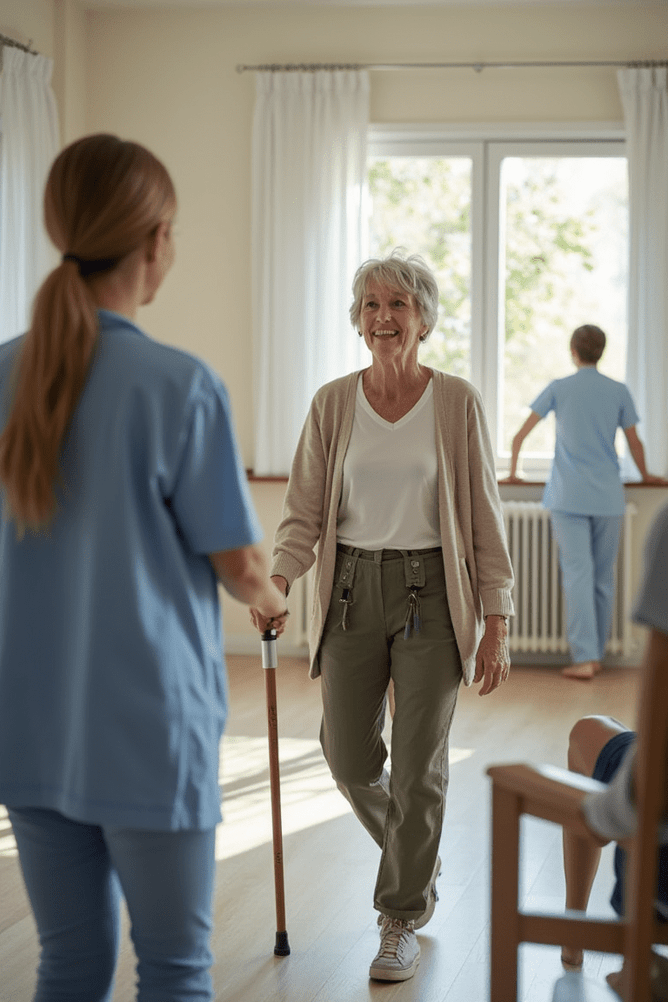Recovering from a stroke is a deeply personal journey. For many people, the road ahead may feel uncertain or overwhelming at first, and that’s okay. While physical rehabilitation plays a key role, we believe true healing is about more than just movement. At Holistic Strength, we take a whole-person approach to post-stroke recovery, supporting not just the body, but also the mind, emotions, and spirit.
Here’s how a holistic recovery approach can help stroke survivors rebuild their lives with confidence and purpose.
1. More Than Movement: Finding Joy in Everyday Activities
It’s common to focus on regaining strength and mobility after a stroke, but emotional wellbeing is just as important. Creative and meaningful activities, like gardening, painting, or listening to music, can lift the mood, spark motivation, and provide a welcome sense of normality. These activities also offer a chance to reconnect with identity and purpose, especially during moments of uncertainty.
You don’t need to be an artist or musician to benefit. Even small acts of self-expression can bring lightness to the recovery process.
2. Nutrition That Nourishes the Brain and Body
What we eat during recovery matters. A well-balanced diet supports healing, energy, and brain health. These are all crucial after a stroke. Focus on meals rich in fruits, vegetables, lean protein, and whole grains. Foods high in omega-3s, like salmon, chia seeds and walnuts, are especially good for supporting brain repair and reducing inflammation.
Our Dietitian works closely with clients to build practical and enjoyable meal plans tailored to their needs. Whether it’s managing appetite changes, learning to cook again, or exploring softer food textures, we’re here to make nutrition feel achievable and empowering.
3. Calming the Mind: Mindfulness and Mental Wellness
Recovery can come with a mix of emotions such as frustration, anxiety, or even grief. Mindfulness practices like gentle breathing, meditation, and guided movement (such as chair yoga) can reduce stress and bring calm to the day. These tools help stroke survivors reconnect with their bodies and emotions in a safe and supportive way.
At Holistic Strength, we integrate emotional well-being into every part of recovery. Healing the mind is just as important as healing the body.
4. The Power of Connection and Community
Isolation is a common challenge after a stroke. Staying connected with others, whether through family, friends, or a local support group, can ease loneliness and build a strong sense of belonging.
Even simple social interactions, like chatting during a group session, can boost mood and encourage progress. We’ve seen firsthand how community involvement can reignite motivation and help people stick to their rehab goals.
5. Creative Therapies That Encourage Confidence
Activities like art and music therapy offer more than enjoyment. They also help engage different parts of the brain. These therapies allow stroke survivors to explore self-expression, improve coordination, and experience emotional release.
Whether it’s singing in a group or painting at home, creative therapies help rebuild confidence and create moments of joy. They’re a gentle reminder that recovery doesn’t have to be all hard work. It can include lightness and laughter too.
Supporting Stroke Recovery with Holistic Strength
At Holistic Strength, our team of Exercise Physiologists, Occupational Therapists, Speech Pathologists, Dietitians, and Allied Health Assistants work together to support stroke recovery in a way that’s person-centred, paced, and meaningful.
We also support NDIS participants and their families in building plans that reflect their unique goals. Whether that’s returning to work, cooking independently, or enjoying community activities again, we are here to help.
Need support after a stroke?
We’re here to help. Get in touch with Holistic Strength to learn more about how our allied health team can support your recovery journey.
